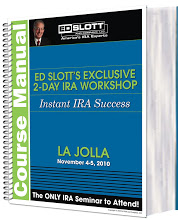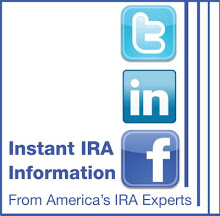This week's Slott Report Mailbag discusses some complex, timely issues involving Roth 5-year rules and other Roth IRA recommendations. As always, we stress the importance of working with a competent, educated financial advisor to keep your retirement nest egg safe and secure.
1.
I converted a traditional to Roth IRA in 2008, then lost money on it, recharacterized for one month and reconverted in 2009, filed the federal and state 2008 amended returns (by TurboTax), and they have both responded agreeing to refund the tax difference.
The Roth is in a personal revocable trust, funded only by Roths, with me as current trustee, i.e. the trust is the owner of the Roth. I paid all taxes for the conversion and reconversion from personal taxable investment funds NOT from IRAs.
The tax refunds will be approximately $70k federal and $12K state.
It would be more beneficial to me and our family if the state and federal tax refunds could be paid to the Roth that suffered the loss, instead of to me.
I assume this is not possible but wanted to check with someone, and would appreciate your advice.
Thank you,
Robert Nicholls
Answer:
You have bigger problems than the investment losses in your Roth IRA. Based on your questions you should definitely consult with an IRA professional. A personal revocable trust CANNOT be the owner of a Roth IRA or any other IRA for that matter. An IRA is an individually owned account and any transfer to a trust during life or after death is a taxable transfer and the funds are no longer IRA funds. A trust, however, can be a beneficiary of an IRA. Check our web site at www.irahelp.com and click on the "Find an Advisor" and you will be able to locate a professional trained IRA advisor in your area that can help you. By the way, IRS does allow tax refunds to go into an IRA by filing Form 8888 with the return but these are considered ordinary contributions and must meet all the contribution rules.
2.
We have several 401(k) plans we would like to convert to Roth IRAs this year. Our question regards the withdrawal of the Roth. When can you withdraw the money from the Roth? Does it have to be in the Roth for 5 years and you have to be over 59 1/2 years old? Or can you withdraw it at any time once you are 59 1/2 years old even though it has not been in the account for 5 years? Also, if you roll 401(k) monies into an existing Roth, are the funds you roll over under the same withdrawal guidelines?
Thanks for the help!
Larry Reaves
Answer:
(Editor's Note: We just came out with a Roth IRA 5-Year Rules Pamphlet Pack filled with information on the 5-Year Rules as well as key questions to ask your financial advisor. CLICK HERE to purchase the pamphlet pack).
This is a question we get often. You can always take a distribution of basis from a Roth IRA. Basis is annual contributions and converted amounts. Those distributions will not be taxed when they are withdrawn as they were subject to tax when they went into the Roth IRA. There are ordering rules for Roth distributions:
Contributions come out first.
Converted amounts come out next-first in, last out.
Earnings come out last.
Distributions must be qualified to be free of all tax penalties. You must have had a Roth IRA (any Roth) for 5 years.
AND
you must be age 59 1/2
OR
the distribution is due to death,
OR
the distribution is due to the disability of the account owner.
OR
the distribution qualifies for the first-time home buyer exception.
The 5 years start with the establishment of your first Roth IRA and cover all future Roth IRAs you many establish. In order words, it only runs once.
Two rules to remember:
Rule #1: Applies to all Roth IRAs and determine if distributions of earnings are taxable. If a distribution is qualified (see above), all funds come out of the Roth IRA income tax and penalty free. If the distribution is not qualified, a distribution of earnings (see ordering rules above) will be subject to income tax and early distribution penalty, if applicable.
Rule #2: Applies to all Roth conversions (including conversions from employer plans). If converted amounts are distributed (see ordering rules above) before they have been held for 5 years AND the account owner is under the age of 59 1/2 at the time of the distribution, the 10% early distribution penalty will be applied to the amount of the distribution. (If after tax amounts were converted to the Roth, then the distribution of the after-tax amounts will never be subject to the penalty). This rule applies separately to each conversion. If you do conversions in 3 different years, you have 3 different 5-year holding periods to track.
And there you have it.
3.
Ed,
I have almost finished your book, "Stay Rich for Life!" and am starting the advisor search for the recommended categories. This is exciting information and gives us hope as a couple.
I have a roll over IRA and a Roth IRA. My employer does not provide any retirement benefits, however I do receive a year-end bonus (taxed as regular income) to help me with retirement. However, last year that amount, $4,000 pre-tax, went over the amount I was able to put into a Roth after tax, due to total income so there was a penalty of more tax. How do I contribute to a retirement fund without being penalized?
We are empty nesters at 51 and able to put away income but not sure how to best achieve that.
Annual combined gross income: $171,500
My wife does contribute in her company's retirement plan. Her individual gross income is $41,000.
Any recommendations?
Thanks,
Steven
Answer:
First, call your local PBS station and find out if and when they plan on airing Ed's new Public Television Special, "Lower Your Taxes Now and Forever!". It is a great special.
You must stay within the limits the IRS has prescribed for contributions. Unfortunately, you hit both IRA contribution limits--income limits for making Roth contributions and income limits for deducting IRA contributions. You should probably put as much as you can in your Roth IRAs and put the balance in IRAs as after-tax contributions. In 2010, you can contribute $5,000 to your IRAs (if your earned income equals or exceeds that amount) and if you are age 50 or older on 12/31/2010 (which it seems you were) you can add another $1,000 for a total of $6,000. If you put after-tax contributions in your IRA, be sure you file Form 8606 with your tax return each year showing your after-tax contributions.
By IRA Technical Consultant Marvin Rotenberg and Jared Trexler
------------------------------------------------------------------------------
Comment, Question, Discussion Topic on your mind? Click on the Blue Comment Link below and leave your thoughts then check back to see what other consumers and advisors think.
*Copyright 2010 Ed Slott and Company, LLC
Thursday, September 16, 2010
5-Year Rules and Roth Recommendations Highlight Mailbag
Posted by
Ed Slott and Company, LLC
at
2:17 PM

 Labels:
Ed Slott,
IRAs,
Mailbag,
marvin rotenberg,
Retirement,
Roth Contributions,
Roth IRAs
Labels:
Ed Slott,
IRAs,
Mailbag,
marvin rotenberg,
Retirement,
Roth Contributions,
Roth IRAs
Subscribe to:
Post Comments (Atom)














0 comments:
Post a Comment